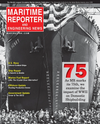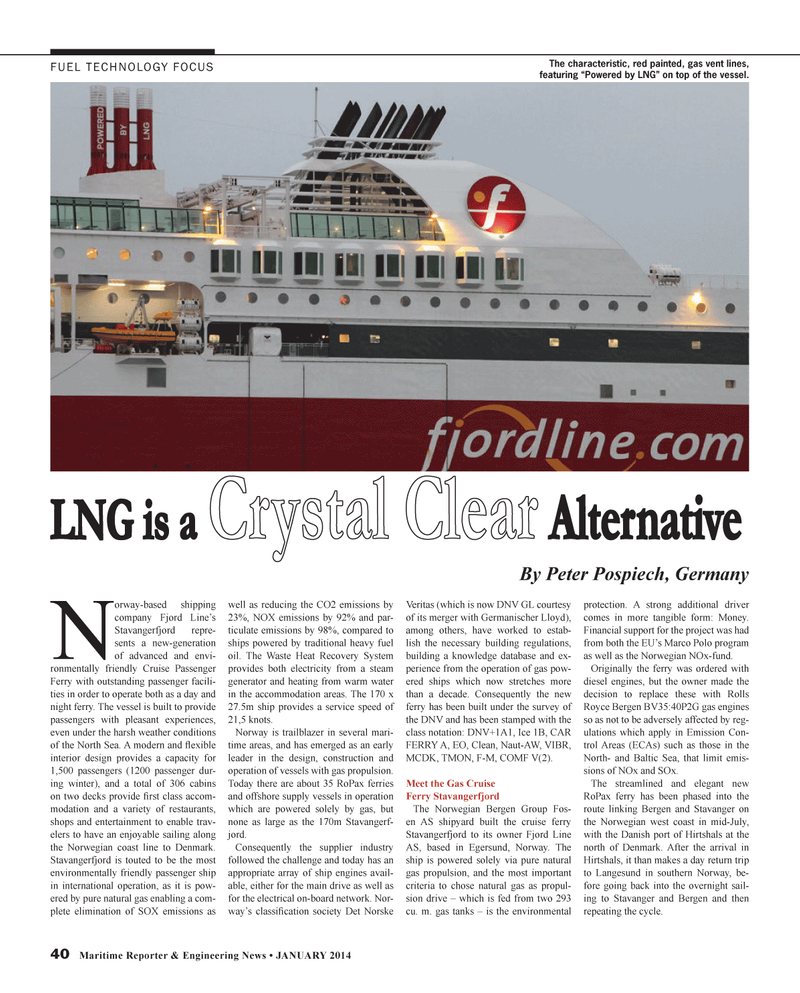
Page 40: of Maritime Reporter Magazine (January 2014)
Ship Repair & Conversion Edition
Read this page in Pdf, Flash or Html5 edition of January 2014 Maritime Reporter Magazine
40 Maritime Reporter & Engineering News • JANUARY 2014
N orway-based shipping company Fjord Line’s
Stavangerfjord repre- sents a new-generation of advanced and envi- ronmentally friendly Cruise Passenger
Ferry with outstanding passenger facili- ties in order to operate both as a day and night ferry. The vessel is built to provide passengers with pleasant experiences, even under the harsh weather conditions of the North Sea. A modern and fl exible interior design provides a capacity for 1,500 passengers (1200 passenger dur- ing winter), and a total of 306 cabins on two decks provide fi rst class accom- modation and a variety of restaurants, shops and entertainment to enable trav- elers to have an enjoyable sailing along the Norwegian coast line to Denmark.
Stavangerfjord is touted to be the most environmentally friendly passenger ship in international operation, as it is pow- ered by pure natural gas enabling a com- plete elimination of SOX emissions as well as reducing the CO2 emissions by 23%, NOX emissions by 92% and par- ticulate emissions by 98%, compared to ships powered by traditional heavy fuel oil. The Waste Heat Recovery System provides both electricity from a steam generator and heating from warm water in the accommodation areas. The 170 x 27.5m ship provides a service speed of 21,5 knots.
Norway is trailblazer in several mari- time areas, and has emerged as an early leader in the design, construction and operation of vessels with gas propulsion.
Today there are about 35 RoPax ferries and offshore supply vessels in operation which are powered solely by gas, but none as large as the 170m Stavangerf- jord.
Consequently the supplier industry followed the challenge and today has an appropriate array of ship engines avail- able, either for the main drive as well as for the electrical on-board network. Nor- way’s classifi cation society Det Norske
Veritas (which is now DNV GL courtesy of its merger with Germanischer Lloyd), among others, have worked to estab- lish the necessary building regulations, building a knowledge database and ex- perience from the operation of gas pow- ered ships which now stretches more than a decade. Consequently the new ferry has been built under the survey of the DNV and has been stamped with the class notation: DNV+1A1, Ice 1B, CAR
FERRY A, EO, Clean, Naut-AW, VIBR,
MCDK, TMON, F-M, COMF V(2).
Meet the Gas Cruise
Ferry Stavangerfjord
The Norwegian Bergen Group Fos- en AS shipyard built the cruise ferry
Stavangerfjord to its owner Fjord Line
AS, based in Egersund, Norway. The ship is powered solely via pure natural gas propulsion, and the most important criteria to chose natural gas as propul- sion drive – which is fed from two 293 cu. m. gas tanks – is the environmental protection. A strong additional driver comes in more tangible form: Money.
Financial support for the project was had from both the EU’s Marco Polo program as well as the Norwegian NOx-fund.
Originally the ferry was ordered with diesel engines, but the owner made the decision to replace these with Rolls
Royce Bergen BV35:40P2G gas engines so as not to be adversely affected by reg- ulations which apply in Emission Con- trol Areas (ECAs) such as those in the
North- and Baltic Sea, that limit emis- sions of NOx and SOx.
The streamlined and elegant new
RoPax ferry has been phased into the route linking Bergen and Stavanger on the Norwegian west coast in mid-July, with the Danish port of Hirtshals at the north of Denmark. After the arrival in
Hirtshals, it than makes a day return trip to Langesund in southern Norway, be- fore going back into the overnight sail- ing to Stavanger and Bergen and then repeating the cycle.
FUEL TECHNOLOGY FOCUS
By Peter Pospiech, Germany
LNG is a Alternative
The characteristic, red painted, gas vent lines, featuring “Powered by LNG” on top of the vessel.
MR #1 (32-41).indd 40 1/7/2014 10:59:20 AM

 39
39

 41
41
